National policy for literature
Jayanthi Liyanage
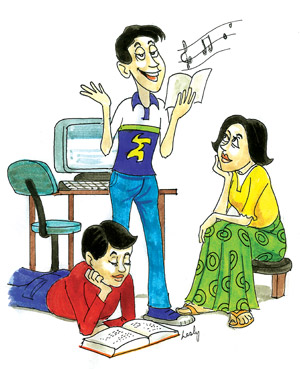 Sri
Lanka’s annual State Literary Awards are well known for the elation they
bring at award announcements as well as the hornet’s nest it stirs up in
the aftermath. Vociferous acknowledgements or denouncements of the
winning entries airing merits or demerits are heard vented on media. Is
our literature climbing to greater heights or is it losing standards? In
the following interview with the Daily News, members of the State
Literary Panel and other distinguished literary personalities present
their views on how the local literature can be uplifted at State level
and individual reader level Sri
Lanka’s annual State Literary Awards are well known for the elation they
bring at award announcements as well as the hornet’s nest it stirs up in
the aftermath. Vociferous acknowledgements or denouncements of the
winning entries airing merits or demerits are heard vented on media. Is
our literature climbing to greater heights or is it losing standards? In
the following interview with the Daily News, members of the State
Literary Panel and other distinguished literary personalities present
their views on how the local literature can be uplifted at State level
and individual reader level
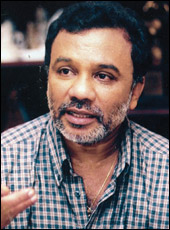 Buddhadasa
Galappaththi Buddhadasa
Galappaththi
State Literary Panel Chairman Buddhadasa Galappaththi expressed his
opinion that to improve literature at State level, a National Policy
should be implemented to uplift not only literature but all arts as they
relate to each other.
“Then even when the Chairman of the State Literary Panel or the
Cultural Minister or the Government changes, the National Policy will
continue to be implemented.”
Changing practices whenever those at the helm changes do not augur
well for the growth of literature.
“In Sri Lanka, the Cultural Ministry does not get the attention it
deserves from any Government,” Galappaththi lamented. “If morals and
arts fall under that Ministry, it should get the same attention accorded
to the Education or the Mass Media Ministries.” He expressed displeasure
at political interferences with the Literary Panel saying that such
measures will hinder the Panel achieving its envisaged goals.
Adequate monies not being allocated by the Government for literary
activities is another major grievance, he said. “Rs.50,000 awarded to
the Best Novel is the highest bestowal in a State Literary Award. Sri
Lanka Book Publishers Association offers Rs. Five Hundred Thousand in
its Golden Book Award to a novel.
Therefore, the private sector encourages writers more. Apart from the
cash award, State Literary Awards carry no other privileges.” State
Literary Awards have 29 categories while awards given from the private
sector cover only a few categories.
“The State must give more recognition to writers. It does not have a
program for writer-exchange with other countries to enable writers to
get acquainted with world literature and be involved actively and
positively.
The Government must have a financing program for young writers and
lesser known writers with potential to get their work published. When
choosing work for publication, creative value must be number one
criterion. There must be a competitive marketing mechanism to take such
published work to readers.
The royalties must be looked after so that respect is given to
writers,” Galappaththi said. A novel printed by the private sector net
work is made available to outstation buyers within one week.
Galappaththi also brought up the question of currently published books
not being up to standards in language and other factors.
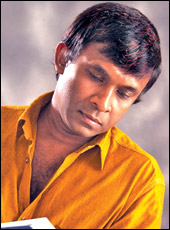 Samantha
Herath Samantha
Herath
Senior Lecturer of Communication and Media Studies at Colombo
University and State Literary Panel Member Samantha Herath supported the
view that a National Policy is neccesary to improve local literature,
adding that to be the need of the hour rather than helping writers at
individual level.
“The environment must be created for them to produce high quality
literature. One example is making available to them good quality paper
to write.”
Herath also emphasized that “The Government must realize that writers
are part of the country’s intellectual community who are involved in
directing the public opinion. Therefore, as an incentive to creating
quality literature, the government must give them freedom to create and
must not expect any other thing from them.”
What prevents us from having a highly developed literary art is our
not having a parallely developed literary criticism. “We need more
critical analysis and review.”
Herath also feels that compared to the past, the level of
appreciating literature in the younger generations is low. “This could
be severe in future. Language used on FM channels has deteriorated. The
government and the intellectual community have a responsibility to
intervene here,” he said. “Time was when cinema, lyrics and arts
critique was university-centered. What we need is not propaganda but
production of literature of aesthetic quality that can broaden people’s
intellectual volume,” he insisted.
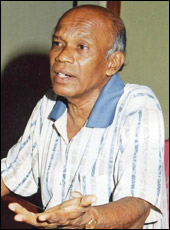 Prof.
Tissa Kariyawasam Prof.
Tissa Kariyawasam
Sahitya Ratne and Sahitya Shoori Prof. Tissa Kariyawasam commented on
the incidence of emerging young talent while the mature writers are not
engaged in literary activity.
“There is a rift between the young and the old. The University people
do not do anything except criticize others. Elderly people who are in
traditional spheres and do not get a place in society, criticize young
talent. The young, when attacked, don’t pursue their talents,” he said.
Prof. Kariyawasam maintains that no government can sponsor a literary
revival unless people read the world literature of the 21st century.
“Without experience, you cannot be a good writer or a literature person.
Only by reading, one gets experience and exposure. Village and
middle-class societies and societies in government institutions can
effect a revival as in the 1960s,” he pointed out. “Children should be
taught literature by their parents but parents think someone else should
do it.”
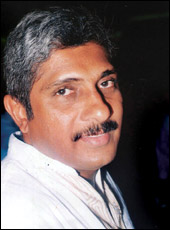 Dr.
Praneet Abeysundera Dr.
Praneet Abeysundera
Senior Lecturer of Department of Sociology and Anthropology at
University of Sri Jayawardenapura Dr. Praneet Abeysundera spoke of the
importance of developing the reading habit at family and school levels.
“The computer and television at home contributed to the lowering of
reading habit,” he indicates. “Family level socialization in reading
stories to pre-scholars and reciting poems are necessary. That is how
aesthetic activities are developed.”
University students are more dependent on the note now, with library
reference reduced. Dr. Abeysudera speaks of the allure of printed word,
written word and the smell of ink, saying that human being s developed
with skills of human hands. “When language was discovered, it stimulated
human nerves and civilization dawned. The story telling now taken
advantage of by teledrama must once again turn to reading,” he stressed.
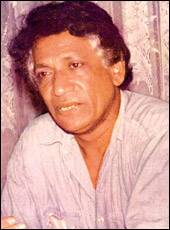 Dharmasena
Pathiraja Dharmasena
Pathiraja
Veteran film-maker Dharmasena Pathiraja, is of the view that all
public institutions relating to art should act as independent bodies and
be free of political interference.
“I will give the specific example of the Arts Council of Sri Lanka.
The existing Arts Council act gives a lot of freedom and space for the
Council to function and take initiatives with regard to its activities.
It is more democratic than its current practice. At the moment, it
acts like a subordinate organ of the Ministry of Cultural Affairs. In
order to broaden the scope of the Council, making it more democratic and
inclusive and to curb undue interference, we should revise the Act.
State sponsorship and promotion of the Arts is a good thing. But
activities related to art should not come under political manipulation
or interference,” he said with a note of finality.
Somachandre Wijesuriya
 Sarasavi
Publishers (Pvt) Ltd.Publishing Manager Somachandre Wijesuriya said that
any Sinhalese who wants to write good literature must first admit the
limitation of perceptions of people in the country. Sarasavi
Publishers (Pvt) Ltd.Publishing Manager Somachandre Wijesuriya said that
any Sinhalese who wants to write good literature must first admit the
limitation of perceptions of people in the country.
“For authors to reach an international level, they must read books
written in English and other languages,” advised Wijesuriya.
“As Gunadasa Amarasekera said, many Sinhala writers are like frogs in
the well. No Sri Lankan writer has reached to Man Booker Prize level.
Sinhala writing is profuse with regional ideas, village type of ideas
and feudal type of ideas, with many influenced by traditions and
Buddhism.”
Amarasekera stated in his book ‘Broken Mirror’ that novels must
reflect real lives of people. Being a novelist who wrote “First Arising”
based on 1971 uprising, Wijesuriya totally agrees with him.
He feels that our literature is stereotyped and panelist members are
advised by University people who themselves do not know what literature
is.
“We cannot even analyze our own culture properly,” he says pointing
out that great literature comes from social situations and that Russian
literature is basically protest novels against the regime.
“Sri Lanka is a small country with Sinhala spoken by only a small
number of people so we have limitations imposed by the language.”
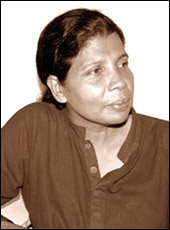 Malini
Govinnage Malini
Govinnage
Writer and State Literary Panel Member Malini Govinnage thinks that
newspapers have contributed to bringing down the status of local
literature. “On one side they promote with pages for short stories,
poems and literary creations. On the other, they are not literary
creations proper, as they have already chosen heroes and heroines and go
along with that.
There should be norms to follow accepted literary theory.”
She also feels that the local writers are not up-to-date in reading
translations.
“In this age of internet, they don’t read. Writers copy from internet
without any morals and pass it as theirs.” Internet is their drive to
widen our information, she says, adding that the local writers operate
in a closed set up, with an island mentality. “A writer should always be
awake and open to receive the world. He should have imagination and
experience on seeing places.”
Govinnage says that our veterans have not read new generation
literature of 1980s and ‘90s while the new generation has not read
classics. Another shortcoming she sees in Sinhala writers is that they
are monolingual. “They should be able to read Tamil literature,” she
ventured.
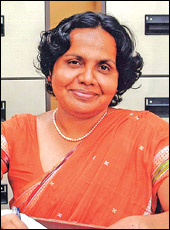 Sunethra
Rajakarunanayake Sunethra
Rajakarunanayake
Winner of State Literary Award and Golden Book Award winner of 2009
for Podu PurushayaSunethra Rajakarunanayake, spoke of the need to have a
village-level program linked to libraries and universities in which
literature-loving young volunteers formed discussion groups of
literature, drama, cinema and other arts in an integrated plan. “This
can be connected with the area’s AGA Office and the Cultural
Department,” she suggested.
“What we need is not personal mud-slinging but civilized criticism of
a book’s content,” bilingual Rajakarunanayake was resolute. “Podu
Purushaya is about loving compassion as a path to peaceful co-existence.
If the Government requests me, I would really like to work with
hard-core LTTE women to take away their anger, “ she was insistent. “We
are not a tribal society.
The above cultural program can also be taken to the Estate sector,”
she felt. “Colombo writers can also join the groups. We have another war
to overcome hatred and jealousy. Culture is all about social change
through loving compassion.” |



